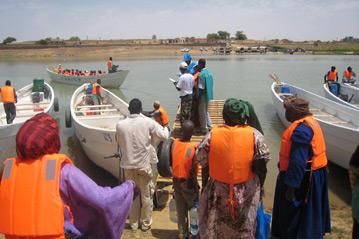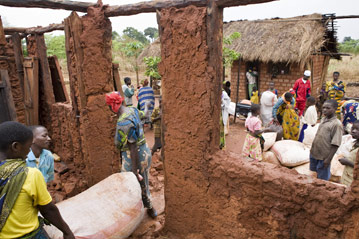Iraq: convoy from Iran, but many choosing not to return
Iraq: convoy from Iran, but many choosing not to return
On Monday, a convoy of returning refugees entered southern Iraq from Iran carrying less than half the number of people who had originally registered to go back. Eighty eight persons opted to stay behind in Iran's Ansar and Matahari camps following news reports of an upsurge in fighting over the weekend in Najaf and Karbala.
This was the first UN-facilitated repatriation convoy to enter Iraq in nearly two weeks. Our last return convoy on May 5 left the same camps, located in western Iran's Khuzestan Province, but subsequent planned movements were halted due to security concerns. Yesterday's movement, which was the 23rd convoy since UN-facilitated returns from Iran began last November, carried only 74 persons.
UNHCR has so far helped more than 6,100 Iraqis return from Iran, all people seeking to repatriate despite the fragile situation in their country. This week we are registering Iraqis in Jahrom and Sarvestan refugee camps in western Iran's Fars Province. We have not yet been able to set a date for this next convoy due to the uncertain security situation in southern Iraq.
More than 120,000 refugees have reportedly spontaneously returned to Iraq's nine southern governorates in the last year where they were registered for food aid under the public distribution system managed by the Iraqi Ministry of Trade. Spontaneous returns from Iran have reportedly subsided in recent months apparently due to fresh fighting in the centre and south of the country.
After undergoing mine awareness training at the frontier, UNHCR's local staff and workers from partner agencies gave Monday's returning refugees various assistance items, including blankets, plastic tarpaulins, household items and tents once they reached a way station in Basra.
The UN refugee agency does not encourage Iraqis to go back to their homeland due to the insecurity and the fragile humanitarian and social environment that has prevailed since the fall of the Saddam government a year ago. Elsewhere in the region we have facilitated the return of 4,856 refugees from Saudi Arabia's Rafha refugee camp, which currently only shelters some 480 Iraqis who fled their country in 1991.
Prior to the fall of the Saddam government last year an estimated 200,000 Iraqi refugees were settled in Iran, many of them victims of the widespread expulsions of Shiites by Iraqi authorities that occurred during the Iran-Iraq war more than 20 years ago. Most of the Iraqis were settled amongst local Iranian host communities, but nearly 50,000 lived in camps mainly in western Iran.
UNHCR continues to help refugee communities and recent returnees throughout Iraq with the support of various national and international relief agencies, but despite the pressing humanitarian situation in Iraq, donor countries have so far not provided any contributions for our 2004 assistance programme. We need $74 million this year for activities in Iraq and assistance to exiles in neighbouring countries.








